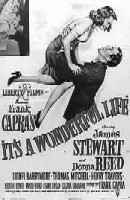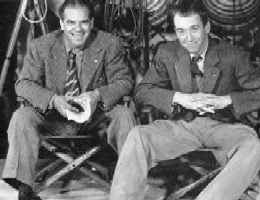
We're an all volunteer website and need your help to keep going. Here are five ways you can contribute: 1 Donate 2 Buy something 3 Submit a story 4 Volunteer 5 Advertise

New in the gift shop, virtualitalia.com logo wear and use items! 
|
PLEASE NOTE: We are experiencing unexpected
technical difficulties caused by our web host. We apologize for
the inconvenience. During your visit you may experience service
and page interruptions - we are in the process of fixing everything and hope to be
fully back on our feet soon.
the wonderful life of frank capra
Capra was born near Palermo in 1897. His family emigrated in 1903 and settled in Los Angeles. After graduating from the California Institute of Technology, Capra started on the lower rungs of the filmmaking ladder, writing gags for Max Sennett of Keystone Kops fame and eventually directing quickie comedies. He emerged as a major director at the end of the silent era and went on to create such classic films as Platinum Blonde, It Happened One Night, Mr. Deeds Goes to Town, Mr. Smith Goes to Washington, Meet John Doe and It�s a Wonderful Life. Capra�s Why We Fight series of propaganda films during World War II was hailed for its truthfulness in explaining the causes of the war and exposing the evils of fascism, which during the 1930s had been quite appealing to many Americans demoralized by the Great Depression. Film historian Joan McGettigan of Texas Christian University says the movie industry was largely invented by immigrants and that their sojourns from Europe to America, from fear to hope, shaped many of the films they made. The immigrants projected an idealistic image of America where the possibilities of success and fulfillment were open to all. "Immigrants like Capra were fleeing situations where they had no future," McGettigan says. "They had no hope of success. But in America, if they worked hard, they could achieve anything."
Capra�s work also reflected his Italian heritage. In many Capra films, key scenes unfold around well-worn tables where families share bread and wine, banter and tease, console and comfort each other. It�s a Wonderful Life has become a Christmas classic, with its subplot of immigrant Mr. Martini moving from a tenement to his own home in a housing development ("No more we live like pigs!" Martini declares as he leaves the slum behind). Audiences busy consuming the plenty of post-war America, however, did not embrace the film upon its release in 1947. After the deprivations of World War II, Americans apparently were in no mood for a meditation on mortality, suicide and self-sacrifice � even one with a happy ending. The film flopped in theaters and then languished for decades as a late-late-late show staple before being rediscovered and embraced as a national treasure during the 1980s. McGettigan says that nearly 100 people from the community around the TCU campus attended a recent showing of Capra�s Clark Gable-Claudette Colbert screwball comedy It Happened One Night. "They were laughing, feeling connected to the characters, feeling all of the warmth from a film made almost 70 years ago. Capra," she says, "was a great storyteller." Even though he is remembered as a warm and fuzzy optimist, Frank Capra was a populist director who realistically portrayed the forces that threatened the American dream: corrupt politics, insatiable monopolies, demagoguery, narcissism. Only one thing, in Capra�s humble view, could triumph over these dark forces � upright individuals who provided the moral glue that held communities together. Capra�s heroes are na�ve and idealistic but surprisingly tough and adaptable.
Conversely, McGettigan says, the villains of Capra�s films embody the obstacles immigrants had to overcome. "All of those people represent institutions that have lost touch with the common people," she says, "but there is also something hopeful about them because they can be redeemed if they reconnect with the people." Between 1922 and 1961, Frank Capra made 42 films, won three best-director Academy Awards and was nominated for three more Oscars. Capra died in 1991, having borne witness to a century that saw the defeat of individual-destroying fascism and Soviet communism. He also lived to see Americans embrace the virtues and lessons he offered in his favorite film, It�s a Wonderful Life. McGettigan says Capra�s films have withstood the test of time and are rediscovered by new generations because they are honest. "The films he made are still some of the most moving, most touching films ever made," McGettigan says. "His message was that everyone can experience the American dream."
|
© 1998-2005 by virtualitalia.com unless otherwise noted
 Frank Capra was to movies what Norman Rockwell was to painting � insightful,
a master of the evocative detail, eternally optimistic. Capra�s characters
in classic films such as It�s a Wonderful Life, Meet John Doe, and Mr. Smith
Goes to Washington, are common people whose spirit and good will enable them
to triumph over more powerful adversaries and claim the opportunities that
America promises. His characters� struggles mirror the immigrants� journeys,
the same journey that brought Capra to America at the age of six.
Frank Capra was to movies what Norman Rockwell was to painting � insightful,
a master of the evocative detail, eternally optimistic. Capra�s characters
in classic films such as It�s a Wonderful Life, Meet John Doe, and Mr. Smith
Goes to Washington, are common people whose spirit and good will enable them
to triumph over more powerful adversaries and claim the opportunities that
America promises. His characters� struggles mirror the immigrants� journeys,
the same journey that brought Capra to America at the age of six.






 More than native-born Americans, immigrant filmmakers like Capra could
see the tremendous contrast between democracy and other political systems.
Their early audiences were drawn from the lower and middle classes; the
upper-crust thought films to be crude, vulgar and a threat to Victorian
morality. Movies eventually became acceptable among all classes of
Americans, but Capra never forgot his own roots or his original audience.
"He constantly reminds his audience that he is one of them, that he sees the
world as they see it," McGettigan says.
By staying true to their ideals, Everyman characters like George Bailey
and Jefferson Smith elevate themselves and those around them while bringing
out-sized and inhumane institutions down a few pegs. In Wonderful Life the
greedy Mr. Potter is thwarted in his attempts to imprison the immigrant
families of Bedford Falls in his slums, while in Mr. Smith a rapacious
Senator is brought to heel and eventually redeemed. In the person of Jimmy
Stewart, star of both films, Capra found the embodiment of the American
ideals he did so much to promote.
More than native-born Americans, immigrant filmmakers like Capra could
see the tremendous contrast between democracy and other political systems.
Their early audiences were drawn from the lower and middle classes; the
upper-crust thought films to be crude, vulgar and a threat to Victorian
morality. Movies eventually became acceptable among all classes of
Americans, but Capra never forgot his own roots or his original audience.
"He constantly reminds his audience that he is one of them, that he sees the
world as they see it," McGettigan says.
By staying true to their ideals, Everyman characters like George Bailey
and Jefferson Smith elevate themselves and those around them while bringing
out-sized and inhumane institutions down a few pegs. In Wonderful Life the
greedy Mr. Potter is thwarted in his attempts to imprison the immigrant
families of Bedford Falls in his slums, while in Mr. Smith a rapacious
Senator is brought to heel and eventually redeemed. In the person of Jimmy
Stewart, star of both films, Capra found the embodiment of the American
ideals he did so much to promote.
